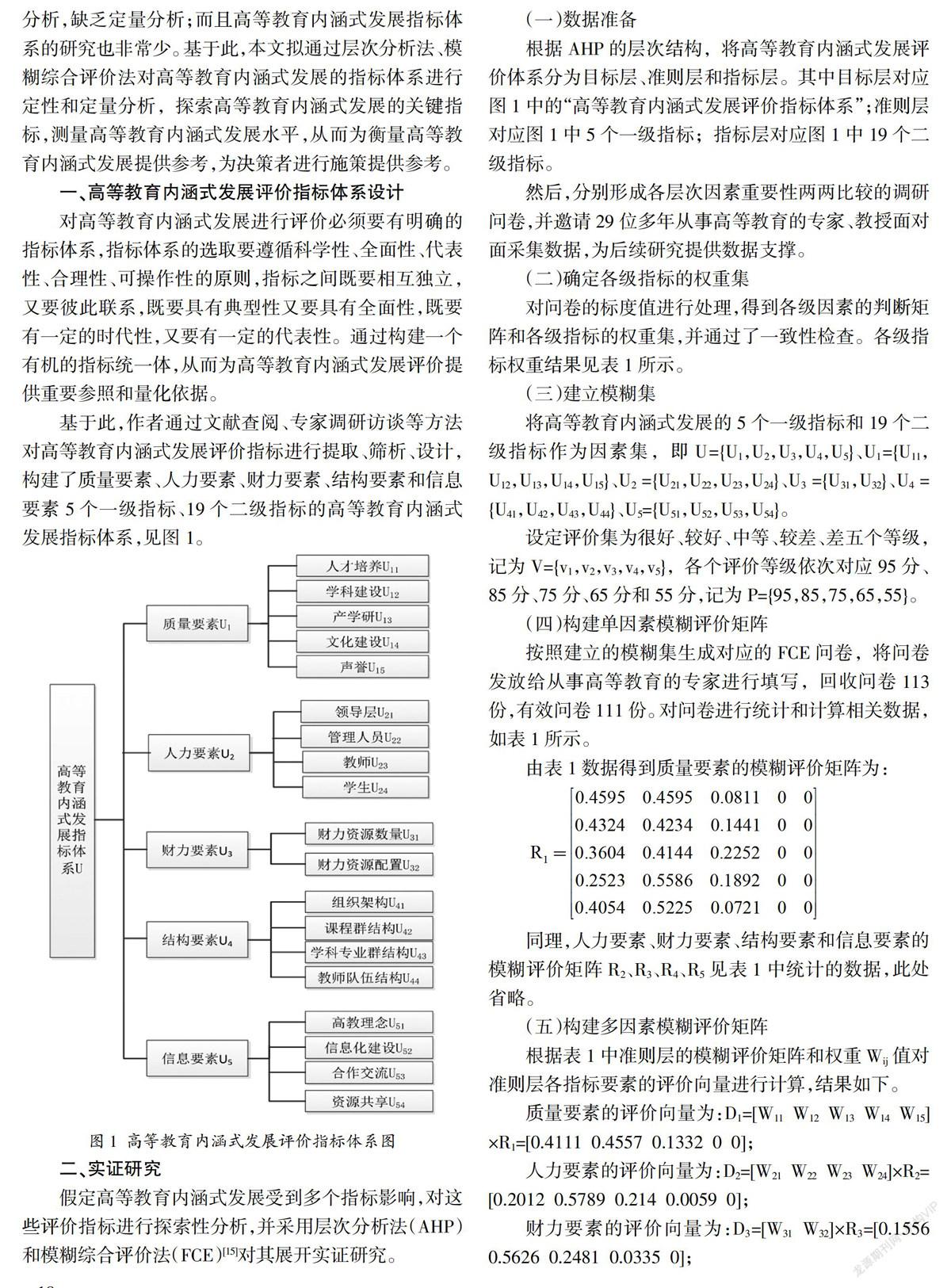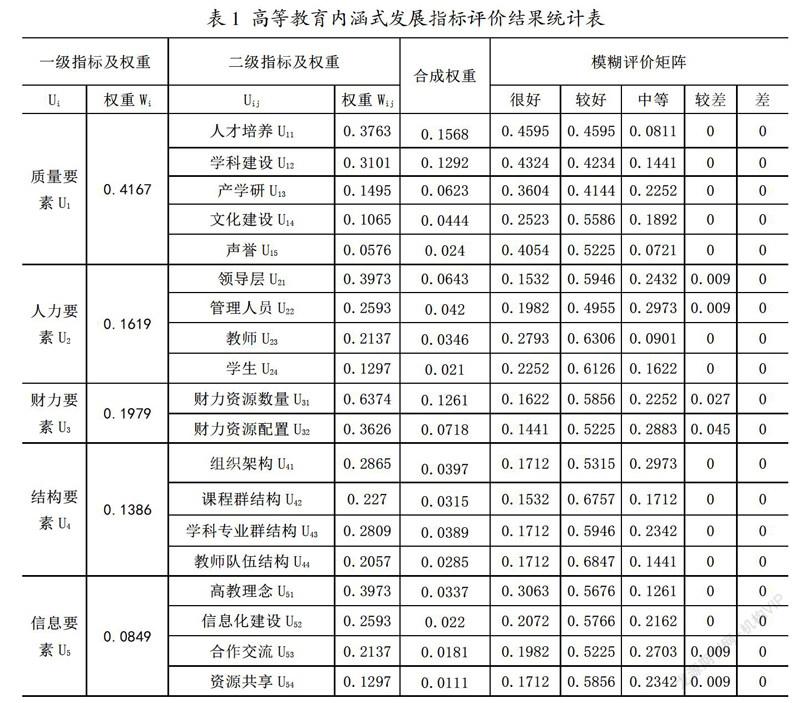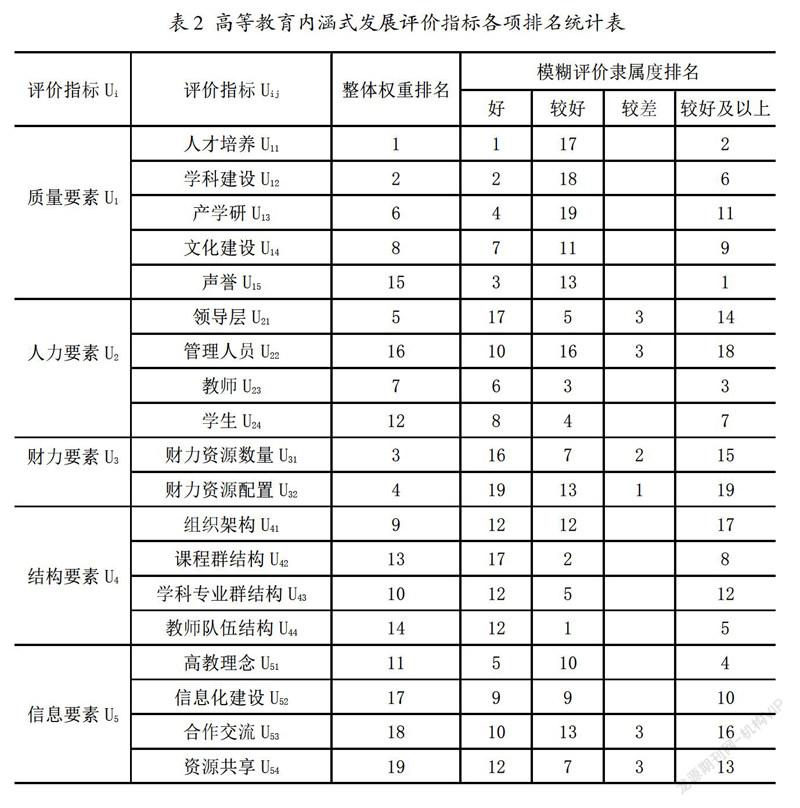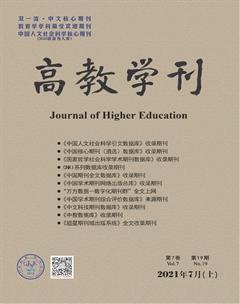高等教育内涵式发展评价指标体系研究
李靖 林玲 鲁圆圆



摘 要:高等教育内涵式发展是我国高等教育发展到一定阶段的必然选择,对其评价指标体系进行研究有利于提升高等教育管理水平,加快高等教育内涵式发展步伐。通过层次分析法和模糊综合评价法对高等教育内涵式发展评价指标体系进行构建及指标权重量化,对高等教育内涵式发展水平进行评价分析。研究结果表明,在19个具体指标中,人才培养、学科建设、财力资源数量指标在高等教育内涵式发展中所占权重最多,其中人才培养是重中之重;依据该指标体系对我国高等教育内涵式发展进行评价的结果为总体处于良好水平,但是在学科建设、产学研、领导水平、管理水平、财力资源数量和配置、组织架构等方面需要大力改善,只有这样才能更好适应高等教育内涵式发展的需求。
关键词:AHP;FCE;高等教育内涵式发展;评价指标体系
中图分类号:G640 文献标志码:A 文章编号:2096-000X(2021)19-0017-05
Abstract: It is an inevitable choice for higher education to move forwards the connotative development in a certain stage. The research on the evaluation index system of connotative development of higher education is conducive to improve the management level of higher education and accelerate the connotative development of higher education. Through the analytic hierarchy process and fuzzy comprehensive evaluation method, this paper constructs the evaluation index system of connotative development of higher education and quantifies the index weight, and evaluates the connotative development level of higher education. The research results show that, among the 19 specific indicators, talent training, discipline construction, and financial resources are the most important indicators in the connotative development of higher education, among which talent training is the most important. The overall level of connotative development of higher education in our country is in a good level, but there are still some shortcomings, we need make improvements in some aspects such as discipline construction, production,teaching and research, leadership level, management level, the quantity and allocation of financial resources and organizational structure, can the connotative development of higher education be met.
Keywords: AHP; FCE; connotative development of higher education; evaluation index system
高等教育内涵式发展是新时代高等教育发展的必然趋势和必然选择[1],是推动高等教育现代化进程的必由之路。党的十九大报告提出要“实现高等教育内涵式发展”,这对我国高等教育赋予了新的历史使命,提出了新的时代要求,同时也为我国建设高等教育强国指明了发展方向。
高等教育内涵式发展是相对于先前的高等教育外延式发展而言的,是一种转型升级式发展[2]。外延式发展重视外在的数量增加和规模扩张,内涵式发展是一种以质量提升为核心的适度规模发展[3],更加注重规模、质量、效益和结构的协调发展[4],突出公平性、开放性、协调性、创新性、共享性[5]。通过构建高等教育内涵式发展评价标准,明确评价指标,有利于更好、更快地推动高等教育内涵式发展进程[6]。
目前,国内很多学者对高等教育内涵式发展进行了一些研究。黄小芳[7]、吴玫[8]从不同维度对高等学校内涵式发展指标体系进行了分析,王洪新等人[9]分析了高等教育内涵式发展中存在的问题,杨秀娟[10]基于“双一流”建设,马廷奇[11]结合“双万计划”,范笑仙[12]基于高等教育哲学视角,对高等教育内涵式发展进行了研究,郭健[13]、康翠萍等[14]从不同方面对高等教育内涵式发展进行了定性分析研究。
從检索文献看,现有研究大部分聚焦于高等教育内涵式发展中存在的问题以及对应的实现路径和策略分析,为本文高等教育内涵式发展评价指标的设计提供了参考。这些研究大都采用归纳、演绎、分析、概括等定性分析,缺乏定量分析;而且高等教育内涵式发展指标体系的研究也非常少。基于此,本文拟通过层次分析法、模糊综合评价法对高等教育内涵式发展的指标体系进行定性和定量分析,探索高等教育内涵式发展的关键指标,测量高等教育内涵式发展水平,从而为衡量高等教育内涵式发展提供参考,为决策者进行施策提供参考。

